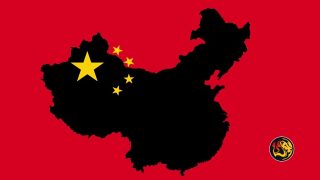
By Stefan J. Bos, Chief International Correspondent Worthy News
BEIJING/HONG KONG (Worthy News) – China, the world’s second-largest economy, faced more hurdles Thursday as Moody’s Investors Service cut its outlook for eight Chinese banks to “negative” from “stable” following the same downgrade to China’s government.
Moody’s also angered Hong Kong by cutting its outlook from “stable” to “negative,” citing tight political, institutional, economic, and financial linkages between Hong Kong and mainland China.
The influential U.S. rating agency was unfair towards Hong Kong, said Paul Chan, the territory’s financial secretary. “I don’t think it is a fair downgrade of our economic outlook. In fact, in terms of our financial system, resilience, our economic resilience, we have very strong buffer … and the economic growth this year is about 3.2 percent.”
Communist-run China was also weighing its options Thursday as downgraded banks included the big four Chinese lenders, Industrial and Commercial Bank of China, Agricultural Bank of China, Bank of China, and China Construction Bank Corporation.
“The change in outlook to negative from stable on these banks is directly driven by a potential decline in the rating or credit quality of the central government, given the change in the sovereign rating outlook,” Moody’s explained.
Moody’s already cut its outlook for China’s government credit ratings to “negative” from “stable” on Tuesday. With the nation facing surging local debt, a property market crisis, and a related economic slowdown, the rating agency expects Beijing’s possible bailouts for distressed local governments and state-owned enterprises to diminish China’s fiscal, financial, and institutional strength.
Moody’s kept China’s sovereign rating at “A1, “ meaning that while still able to meet its financial obligations, it is more susceptible to the adverse effects of changes in circumstances and economic conditions than nations with higher ratings.
JAPAN-LIKE STAGNATION
Economic experts have warned that Moody’s ratings suggest China’s economy could face Japan-like decades of stagnation.
Yet China’s state-run media, viewed by critics as mouthpieces of the communist government, condemned Moody’s negative rating outlook as “biased,” and there was concern about the rating agency’s staff in China and Hong Kong.
Ahead of this week’s negative ratings on China and its banks, Moody’s reportedly told staff in China to work from home amid concerns about a possible government crackdown.
Workers in Beijing and Shanghai were instructed to stay home, while staff in Hong Kong were reportedly told to avoid traveling to the Chinese mainland.
“They didn’t give us the reason … but everyone knows why,” one China-based Moody’s employee told the Financial Times newspaper. “We are afraid of government inspections.”
“The Chinese authorities can make trouble for you if they want to,” another employee said, adding that Moody’s was concerned about what regulators might do following the credit downgrade.
Moody’s declined to comment on “internal discussions” due to its “commitment to maintaining the confidentiality and integrity of the ratings process.”
MORE PRESSURE
However, the reported concern comes during pressure on Western companies operating in the country amid rising tensions between the United States and China.
The U.S. government hit its geopolitical rival with a series of sanctions “in an attempt to cripple China’s microchip industry,” economic watchers noticed.
“The offices of US firms Mintz Group, Bain & Company, and Capvision were all raided earlier this year by Chinese authorities, with some employees being questioned and detained,” the Business Insider website recalled.
American companies have also been targeted in other ways, with Chinese regulators effectively scuttling Intel’s $5.4 billion acquisition of Israeli microchip firm Tower Semiconductor.
Additionally, the Chinese government reportedly banned some officials from using Apple’s iPhones.
Updates to its anti-espionage laws, passed in April, “are also making it tougher for U.S. businesses to operate in China,” Business Insider commented.
Yet, Western firms seem reluctant to leave unless they have to.
JP Morgan boss Jamie Dimon reportedly told the New York Times’ Dealbook conference that while the Wall Street bank “would pull out of China if the U.S. government ordered it to do so,” he didn’t think that was likely to happen — “unless China invaded Taiwan.”
Copyright 1999-2026 Worthy News. This article was originally published on Worthy News and was reproduced with permission.
Latest News from Worthy News
The Trump administration has finalized a sweeping reciprocal trade agreement with Taiwan, confirming a 15 percent U.S. tariff rate on Taiwanese imports while securing broad new market access and purchase commitments for American goods.
Democrats are applauding White House border czar Tom Homan’s Thursday announcement that immigration enforcement operation in Minnesota will end next week.
Democrats in the U.S. Senate tanked the Homeland Security full-year funding bill in a last-ditch vote Thursday, all but guaranteeing a partial government shutdown starting Saturday.
Mourners in a remote Canadian town grappled Thursday with the aftermath of one of the country’s deadliest school shootings in decades, as families, survivors and leaders reacted to the tragedy that left eight victims — most of them children — dead, along with the 18-year-old suspect.
A gunman who opened fire at a school in southern Thailand’s Hat Yai city on Wednesday wounded a teacher and a student before being detained, authorities said, in a rare attack that sent students and staff into panic.
The Republican-led House of Representatives has passed the Safeguard American Voter Eligibility (SAVE) America Act, advancing legislation that would require proof of citizenship to register to vote and photo identification at the polls. The bill now heads to the Senate, where its future remains uncertain amid strong Democratic opposition.
Israel’s Ministry of Defense announced on Wednesday that its advanced David’s Sling air and missile defense system has completed a series of complex modernized tests, a development officials say bolsters the country’s defensive posture as tensions with Iran escalate and the United States prepares military options that could include direct strikes.







